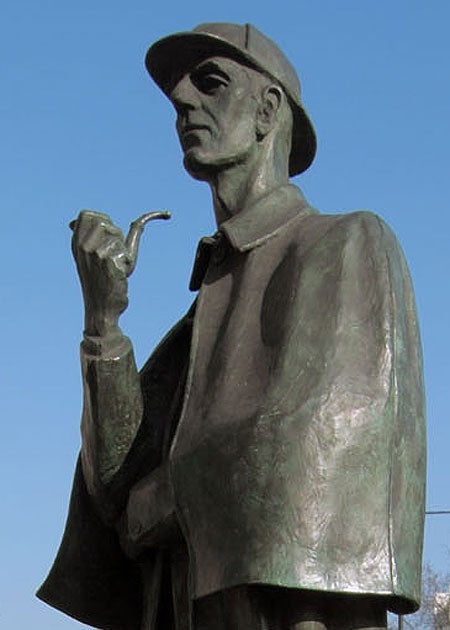Sherlock Holmes and the case of the Hollywood duel

Sherlock Holmes, the pipe-smoking Victorian super-sleuth with a penchant for cocaine, is to become the subject of a face-off by two Hollywood studios which are both bringing out films about Sir Arthur Conan Doyle's literary hero.
In one camp is Columbia Pictures, which has announced the making of an untitled comedy starring Sacha Baron Cohen as Holmes with Will Ferrell as his sidekick, Watson.
Squaring up to Columbia is Warner Bros, which has announced a Guy Ritchie project entitled Sherlock Holmes, which will portray the legendary detective as a punching, sword-jousting comic book-style adventure hero.
While Conan Doyle traditionalists will be alarmed about the reinterpretation of his literary legacy, few would argue that Holmes, who lived a bachelor's life in his Baker Street lodgings with Watson, does not have mass-market appeal. But film experts agree that only one "big studio" film can be a winner.
Archie Thomas, from Variety magazine, said two similar releases would inevitably lead to "brinkmanship" in a race to get the film out first – as happened with the two movies about the author Truman Capote in 2005-06.
"Presumably they have done their research and there is an appetite for Sherlock Holmes," he said, "but is there an appetite for two?"
Ritchie's vision is based on a comic book created by the Harry Potter producer Lionel Wigram, and has been slated for release in 2010. The casting is unconfirmed but Robert Downey Jnr – a reformed drug addict himself – has been rumoured. Fans of Ritchie's hit film Lock, Stock and Two Smoking Barrels, about London's criminal underworld, will inevitably be drawn to a remake that is said to give Holmes a "gangland makeover". The studio says it wants to "reinvent" Holmes and Dr Watson to make him more "adventuresome", focusing on his skills as a boxer and also a swordsman.
But Columbia's Sherlock may, ultimately, have the greater advantage, in its co-producer Judd Apatow, one of Hollywood's hottest talents, who has produced the successful 40-Year-Old Virgin and Knocked Up. Louise Tutt, deputy editor of Screen International, called Apatow "Hollywood's filmmaker de jour", adding: "He is a brand in himself. Anything he gets attached to gets 'green lit', given money by the studio." For that reason, she suggested, his Holmes is closer to the big screen. The casting of Cohen and Ferrell together, after their chemistry in the film Talladega Nights, will not hurt its chance at the box office. The director has not yet been announced; a late 2009 release seems the most probable.
The one cloud hanging over Apatow's film is the charge that transforming a classic crime thriller into a rambunctious comedy is sacrilege, although there have been occasional comic versions that have proved successful, including Peter Cook and Dudley Moore's 1978 performances in The Hound of the Baskervilles, and 1988's Without A Clue, starring Michael Caine and Ben Kingsley.
The films are likely to cause a rekindled interest in the hero and boost the film tourism industry, according to the UK Film Council. A spokesperson said: "We've found that many UK locations experience a dramatic rise in visitor numbers when they are shown on the silver screen."
The legendary detective of Baker Street
The Baker Street detective was the invention of the Scottish author and physician, Sir Arthur Conan Doyle, first appearing in print in 1887. More than a century later, he remains one of the canon's most memorable heroes, not just for his supreme powers of "deductive reasoning" but also for his predilection for injecting morphine and cocaine at his bachelor pad, which he shared with his decidedly less brilliant companion, Dr Watson. He took drugs when he lacked stimulating cases. Watson described that as Holmes's "only vice" but was the one to wean Holmes off drug use. He also went without food for long periods during his more intense criminal cases.
Holmes appeared to be aware of his flaws. In one book, he described himself as "bohemian" – he was disorganised and, as Watson notes in The Adventures of the Musgrave Ritual, he left everything from his notes of past cases to remains of chemical experiments scattered around their apartment, as well as tobacco left inside his Persian slippers.
Portrayed as a genius, rarely seen out of his tweeds and deerstalker hat, he was the protagonist of four novels and 56 short stories – almost all narrated by Watson.
Join our commenting forum
Join thought-provoking conversations, follow other Independent readers and see their replies
Comments
Bookmark popover
Removed from bookmarks